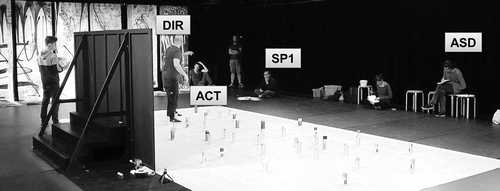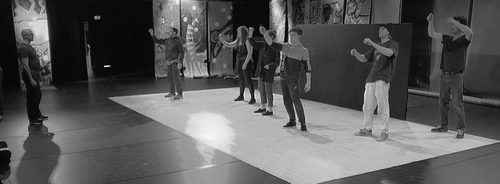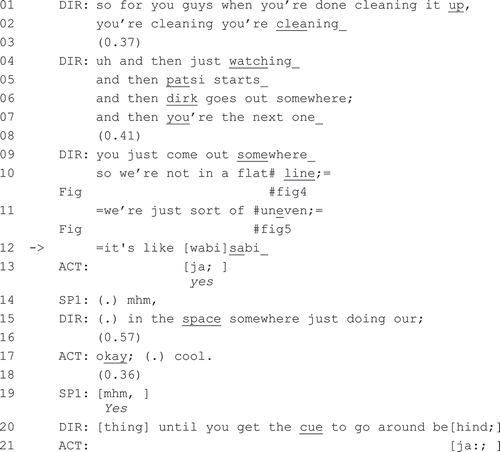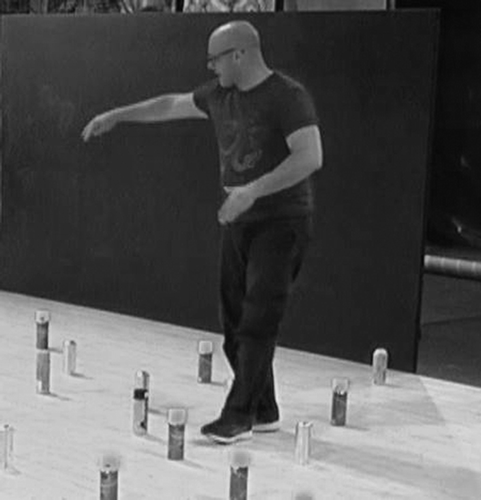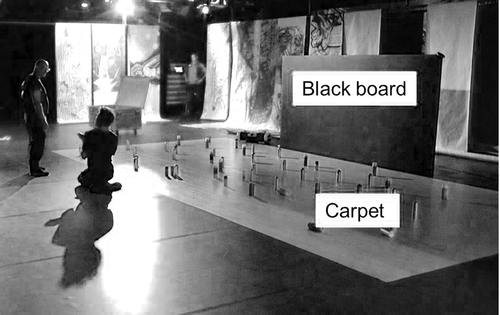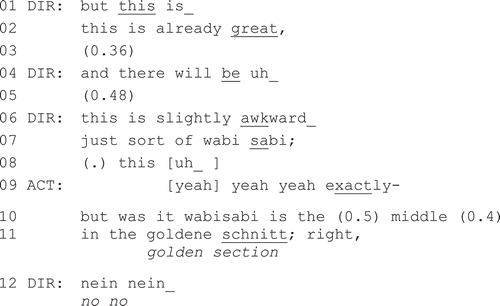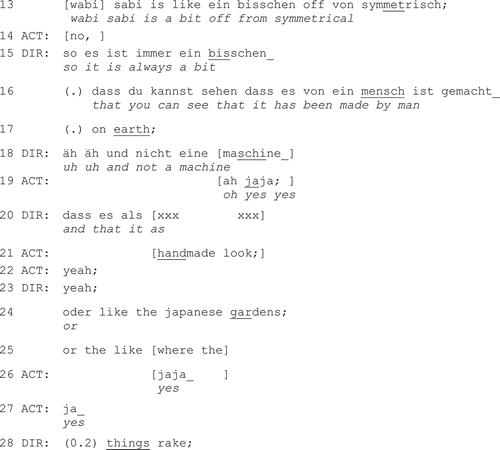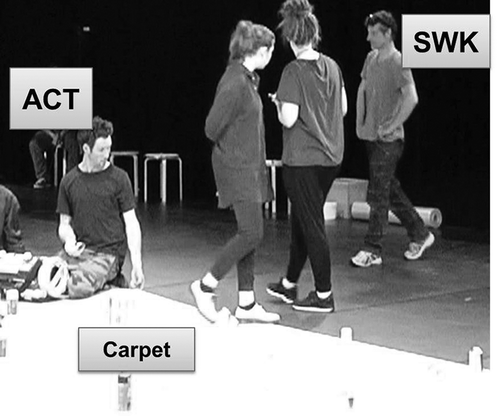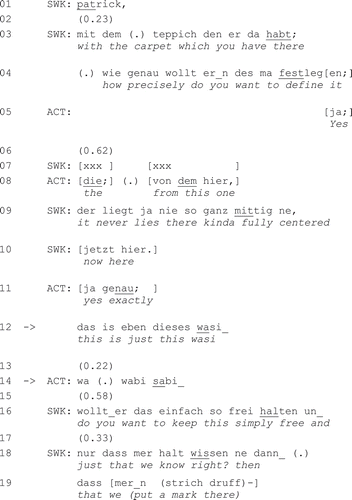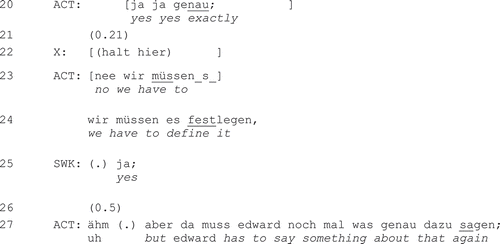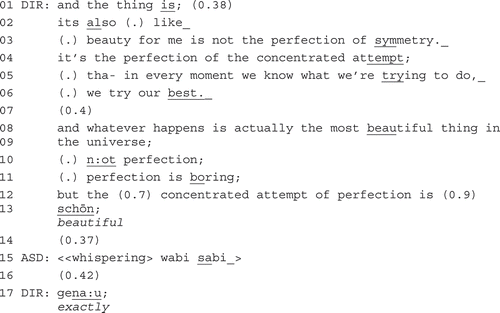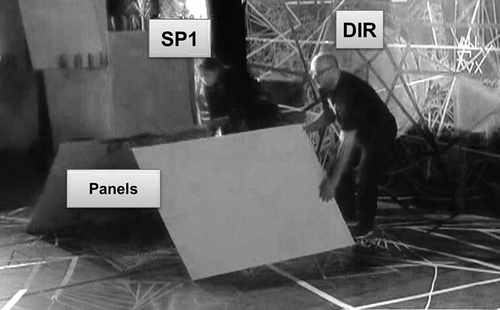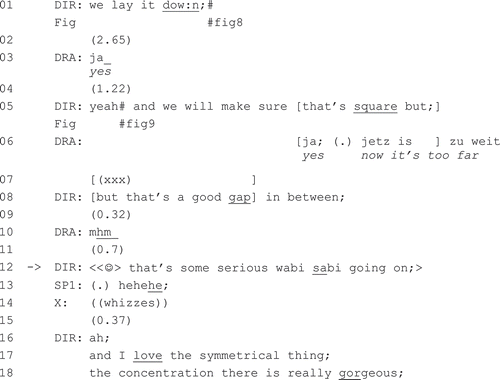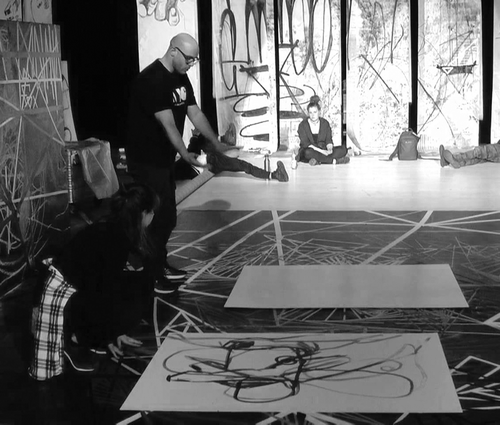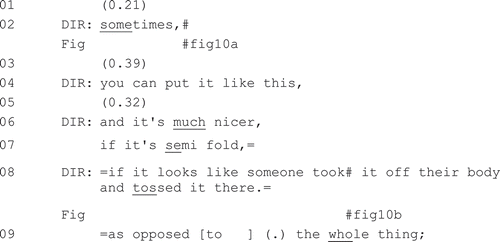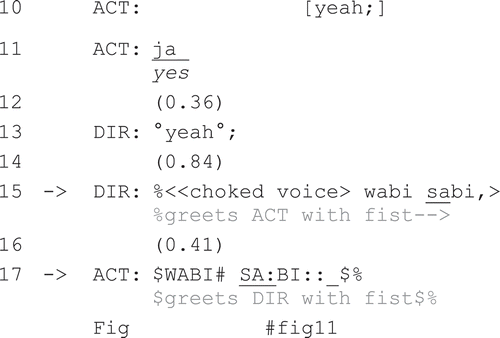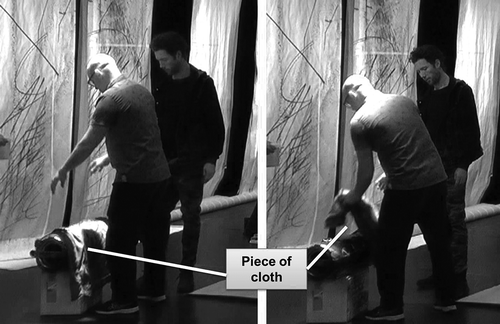ABSTRACT
Taking the use of the esthetic term wabi sabi (Japanese compound noun) in a series of German- and English-language theater rehearsals as an example, this article studies the emergence of shared meanings and uses of an expression over an interactional history. We track how shared understandings and uses of wabi sabi develop over the course of a series of theater rehearsals. We focus on the practices by which understandings of wabi sabi are displayed, adopted, and negotiated. We discuss complexities and intransparencies of the manifestation of common ground in multiparty interactions and its relationship to the emergence of routine uses of the expression. Data are in English and German with English translation.
Relevant meanings in social interaction are social meanings (Wittgenstein, Citation1950/1953), i.e., they have to be shared to a degree that is sufficient for practical purposes (Schütz, Citation1932/1967) and must be procedurally consequential for the ensuing interaction (Schegloff, Citation1991). The meaning of expressions in naturally occurring social interaction is an area of research that has not received much attention yet (but see Bilmes, Citation2011, Citation2015; Deppermann, Citation2005, Citation2011b, Citation2020). One reason for this lies in the opacity of meaning. People’s language use and their displays of understanding are highly indexical, i.e., laden with presuppositions and implicitness (Garfinkel, Citation1967). This is because actual meanings of an expression have developed from prior experiences in past interactional exchanges, leading to presuppositions of common ground.
The study presented in this article is motivated by an interest in the anatomy of shared meanings. To make meanings amenable to the observational methodology of Conversation Analysis, we chose a case in which an expression is newly introduced within a community of practice, and we track how shared understandings and uses of the term develop over an interactional history of 20 days. Our study focuses on the appropriation of the Japanese esthetic concept wabi sabi (henceforth: WS) by a “transient project community” (Hazel, Citation2017) in a series of German- and English-speaking theater rehearsals. At the beginning of the rehearsal process, WS is introduced by the director as an overarching guideline, but it is unknown to the other participants. We focus on the practices by which the meaning of wabi sabi is appropriated and negotiated and on the ways in which common ground concerning WS develops and becomes manifest (or not).
In the next section, we give some background on the study of shared meanings in interaction, introducing the concepts of “common ground” and “grounding.” We then explain our methodological procedure and describe the setting studied. The main body of the artice (Analysis section) is devoted to the analysis of six chronologically ordered extracts of the use of WS in a series of theater rehearsals. In the last section we discuss the contributions of our study to the understanding of the longitudinal development of meaning in social interaction and what it tells us about the emergence of commonalities of use and meaning within a community of practice.
Shared meanings in social interaction
Shared meanings in social interaction cannot just be presupposed, e.g., by appeal to cultural knowledge. Shared meanings are accomplished in social interaction by sequentially organized, responsive actions. This crucially involves that whenever participant A has produced a turn to be understood, B’s response will be inspected by A for what understanding of A’s prior turn it displays, and A’s next turn will either confirm or correct B’s understanding (as A has understood it) (Arundale, Citation2020, chapter 3; Deppermann, Citation2015a; Sidnell, Citation2014). By such mutual displays of understanding, called “grounding,” shared understandings emerge in interaction, termed “(dialogue) common ground” by Clark (Citation1996a, Citation1996b; Clark & Brennan, Citation1991; Clark & Schaefer, Citation1992; Fetzer & Fischer, Citation2007). In contrast to prior approaches to common ground (e.g., Stalnaker, Citation2002), this notion of common ground includes:
that common ground is not just mutually ascribed knowledge but that it is accomplished by observable actions that give evidence for the participants’ interpretations;
that it is not static and stable but dynamic and constantly subject to change and revision;
that it is not only a prerequisite but, reflexively, a product of social interaction.
Still, Clark distinguishes between communal common ground that is shared among a larger community (social group) and personal common ground that is based on shared personal experience and interactional histories (Clark, Citation1996b).
Clark’s approach has encountered criticism from an EMCA perspective. Concerning the use of common ground as a presupposition in talk, Edwards (Citation1997, p. 123) rejects a cognitive account in favor of a rhetorical view:
the packaging of a piece of information as “given” (or “new”) is no guarantee that it is psychologically common (or new) knowledge, nor even that participants assume it to be. It has to be seen as way of treating something as given, and even as “information,” rather as a particular and possible contentious version of things.
Koschmann and colleagues have argued that the content of common ground is much more opaque than Clark seems to assume; especially within a single episode of interaction, it is hard to determine which knowledge participants actually take to share (Koschmann & LeBaron, Citation2003; Koschmann et al., Citation2001). This is even more the case in constantly changing and ambiguous environments (e.g., as in surgery) that do not offer straightforward perceptual evidence; here, linear accumulation of common ground is not warranted.
We are thus faced with a dilemma: It is evident that in social interaction participants must presuppose prior knowledge and common ground to recipient-design their actions, but both the content of these actions and its emergence are analytically opaque to a high degree. In this study, therefore, our approach is to track how common ground concerning a specific expression is built from the very beginning of its use and how it emerges, changes, and is used over an interactional history (see Deppermann, Citation2018 for a methodological account of this approach). By this, “common ground” is not taken as a (speculative) explanatory cognitive concept but as something that is observably built and used over an extended interactional process within a community of practice (Lave & Wenger, Citation1991; Wenger, Citation2008).Footnote1
Data and methods
To investigate the emergence of shared understandings and uses in a methodically controlled way, we adopt a longitudinal approach (Pekarek Doehler et al., Citation2018), which allows us to track how they emerge over interactional episodes. There are two major methodological problems: first, how to take prior knowledge into account; second, how to secure that the selected instances are comparable.
We address both problems by studying a series of theater rehearsals. Theater rehearsals are a “perspicuous setting” (Garfinkel & Wieder, Citation1992) for longitudinal studies (Hazel, Citation2018). They involve the formation of a “transient project community” (Hazel, Citation2017; Mortensen, Citation2017) within a bounded time frame of a few months. Their aim is to devise the performance of a play and to build shared performing routines. Shared knowledge among participants is built by frequently repeating the scenes of the play. This process of building knowledge is made publicly available by instructions and their implementations, which provide a demonstration of understanding. In contrast to other settings like families or friendship networks, where types of activity and participants are often changing, the repetitive nature of theater rehearsals allows for the necessary comparability for longitudinal approaches on a “micro-genetic” (Pekarek Doehler et al., Citation2018, p. 16) level, as the kind of task and participants are kept largely constant.
Our study is based on a corpus of 200 hours of video recordings (20 rehearsal days).Footnote2 In order to be able to track the building of common ground as completely as possible, we recorded the rehearsal process extensively from its beginning until the premiere. In our article we focus on a series of interactional episodes between roughly the same participants, in which they use and interpret a newly introduced expression. Our approach is more specific and restricted than previous studies on common ground. We are interested in how the shared use and understanding of a specific expression develops over time in a community of practice. We are not so much interested in what Clark (Citation1996b) has called “communal common ground,” which relies on shared conventions. Rather, we are interested in emerging and highly context-specific knowledge, which cannot be presupposed in the beginning of the interactional history and which is actively produced and displayed to be understood. In contrast to other longitudinal studies (for instance, for studies on second-language acquisition, see, e.g., CitationPekarek Doehler & Balaman, 2021/this issue; Pekarek Doehler et al., Citation2018; CitationSkogmyr Marian, 2021/this issue), we do not focus on individuals’ increase in interactional competence, but we deal with change as the publicly available process of negotiating and accumulating knowledge within a community of practice.
Our study focuses on the appropriation of the Japanese expression wabi sabi (henceforth: WS) by the members of a German- and English-speaking ensemble. WS was introduced by the director in the beginning of the rehearsals as an overarching esthetic concept, which should inform the design of the play. It was not known to the other participants before, so there was no common ground concerning its meaning.
Originally, WS is a Japanese compound noun. It is one of the core notions of Zen (Suzuki, Citation1959). It denotes, very roughly, an appreciation of the imperfection of natural beauty and of poverty and decay (Koren, Citation2008). WS has been contrasted with (so-called) Western esthetics, e.g., in terms of natural versus man-made materials, warm versus cool, or organic versus geometric (see for typical examples of WS esthetics).Footnote3
Because of its vague, abstract, and at the same time omnirelevant nature, WS is implemented variably in different contexts of the play. Its indexical interpretation is subject to contextually bound explication, exemplification, and accounting each time it is invoked. We show that situated application, tentative uses, and theoretical reflections lead to an accumulation and consolidation of common ground concerning WS but also to (apparently) competing meanings. An increasingly richer, more stable, but also more complex understanding of WS evolves over time in this community; members increasingly start using it for making esthetic assessments.
The play Nothing Twice was developed over the course of the rehearsals, heavily drawing on hip-hop music, dance, and graffiti. There was no script in the beginning (so-called devised theater); the participants developed the scenes on the fly. WS served as an esthetic guideline, mainly for the arrangement and evaluation of visual configurations. The ensemble consists of a director/choreographer, an assistant director, one actor, three dancers, two graffiti sprayers, a dramaturge, and a dance pedagogue, occasionally joined by stagehands, light technicians, and costume designers. The participants who mainly feature in our extracts are represented in . Participants often switch between German and English in the rehearsals, the director being a speaker of American English.
In our corpus we found 14 sequences in which WS was (sometimes repeatedly) used. The concept was briefly introduced by the director at the beginning of the rehearsals. He clarified the Japanese origin of wabi sabi and explained that it is an esthetic concept that values asymmetry and disorderliness.Footnote4 We analyze six chronologically ordered extracts, which range from the first uses of the term at the beginning of the rehearsals to later uses just before the opening night.
Analyses
In Extract 1, the director (DIR) uses WS the first time in the context of instructing stage actions. He directs the ensemble to line up on the stage in a certain formation while “painting in the air” ().
We join the action when DIR addresses the ensemble on how to manage the transition from the previous scene to the scene where they are all painting the air:
Extract 1. It’s like wabi sabi (2-wabisabi-Tag-11-76.1d).
The director describes the actions that the individual actors should perform (lines 01–09): cleaning, watching, starting, going out, and coming out. Then he describes the resulting body formation by a three-part list: After two negative items, not in a flat line (line 10) and sort of uneven (line 11), he positively categorizes the formation as like wabi sabi (line 12). The first two predications refer to tangible visual formations; their understanding does not require expert knowledge. They are accompanied by illustrating gestures depicting not in a flat line by drawing a flat line with both arms () and sort of uneven by moving his hands back and forth several times in opposite directions (). The third predication, wabi sabi, is introduced by way of comparison (it’s like). The director does not use WS for an instruction but as a concluding esthetic assessment, accounting for the previous instructions (not in a flat line, uneven). The TCU in line 12 ends with level intonation projecting turn continuation.
The director does not explicate what WS means. He uses it as an expression that can be unproblematically understood to legitimize his esthetic decision. In doing so, he presupposes an understanding that he had introduced in the conceptual phase of the rehearsals (see Data and Methods section). However, reflexively, the situated meaning of WS is anchored in the director’s preceding predications not in a flat line and sort of uneven and his demonstrations of these. They endow WS with a local referential specification, which is negatively defined. In this way, the abstract concept (however it might be understood) is enriched by this situated meaning.
Members of the ensemble (ACT and SP1) confirm the director’s assessment it’s like wabi sabi by acknowledgment tokens in lines 14 (mhm) and 17 (okay), together with an evaluative token (cool, line 17). However, it is not clear whether they respond to the entire instruction or specifically to the concluding assessment. Their feedback treats wabi sabi as unproblematic; yet understanding is only claimed, not demonstrated (Sacks, Citation1992, p. 141 et seq.). Since the director’s instructions can easily be understood without a clear understanding of WS, recipients would not be in need for clarification in case they do not understand the expression or are not sure if they understand it correctly.
In terms of the use and the accomplishment of common ground concerning WS, Extract 1 exhibits a complex and fragile constellation of different perspectives:
Presupposition and confirmation of common ground: By the way the director uses WS in this extract, he presupposes common ground. He does not explicate its meaning; on the contrary, he apparently uses it to validate his instructions. The recipients’ responses seem to confirm that the presupposition of common ground is warranted, i.e., WS does not cause any problems in the process of mutual understanding.
Insecurity whether the assumption of common ground is warranted: For several reasons, both participants and analysts cannot be sure whether a shared understanding of WS has been achieved: the fuzzy, potentially more global scope of the recipients’ responses, their highly indexical and inexplicit semiotic properties, and the fact that a correct understanding of the assessment conveyed by WS is not essential for successful intersubjective interactional progression of the sequence. Recipients may just have followed a “let it pass” strategy (Garfinkel, Citation1967, p. 3; Firth, Citation1996). This would be unproblematic in the given context because no demonstration of understanding is due in this sequential environment.
Partial inferability of relevant aspects of local meaning: Even if the director’s presupposition of common ground concerning the meaning of WS was not warranted, the recipients can infer at least parts of the local meaning of the (potentially unknown) expression from the sequential context of the director’s preceding descriptions and from the visible material context to which WS is applied. In other words, contextual cues arising both from the director’s turn design, its content, its gestures, recognizable actions (descriptions and concluding positive assessment), and the contextual configuration (Goodwin, Citation2000, pp. 1500–1505) can be used by the recipients to construct the local meaning of WS—either as a guess about a possible, locally suitable meaning of WS or as a local enrichment of a more abstract meaning of WS they have already known before. Furthermore, even if the notional meaning of WS escapes the recipients, the sequence provides them with an example how WS can be used and which action can be accomplished with it—a positive assessment concerning the esthetics of a visual configuration.
Extract 1 shows how an interactional episode that runs smoothly and without any indication of a problem of intersubjectivity on the surface can be intransparent; at the same time, it is laden with many different possibilities concerning the existence of common ground and the achievement of intersubjectivity. In Extract 1, the presumption of common ground may have been warranted, there may have been (nearly) no common ground about the meaning of WS at all, or some common ground about its meaning may have resulted from the local use and contextual interpretation of the term. We cannot decide between these possibilities only from knowing the extract in isolation. Yet we have to note that this high degree of opacity is only possible because the recipients neither perform nor are forced to perform responses that clearly exhibit their understanding of WS because it is not a sequential environment in which a demonstration of understanding is locally relevant.
The next instances of WS in our data clearly show that the participants do not (and thus did not have before) a common ground concerning its meaning.
On the next day, the director and the actor (ACT), who had been agreeing enthusiastically (cool) in Extract 1, talk about the location of a carpet in relation to a blackboard ().
This local issue gives rise to a discussion about the meaning of WS:
Extract 2. Wabi sabi is the middle in the goldene schnitt (3-wabisabi-Tag-12-77.1b).
The director evaluates the position of a carpet on the floor as this is already great (line 02). He accounts for his assessment by describing the position as slightly awkward (line 06), which—like in Extract 1—is followed by a concluding assessment just sort of wabi sabi (line 07). Here as well, WS reflexively receives a local semantic specification by a preceding predication (awkward). The assessment again is strongly confirmed by ACT, indexing a claim to expertise (yeah yeah yeah exactly, line 09).
ACT adds a candidate understanding of WS: but was it wabi sabi is the middle in the golden section right (lines 10–11). By this, he connects the descriptive level (awkward, line 06) with a conceptual level (wabi sabi, golden section) and grounds his understanding of the foreign cultural concept WS in what he believes to be a similar familiar esthetic concept, the golden section.Footnote5 ACT thereby displays expert knowledge—he shows that although he is not sure about the meaning of WS, he can locate it within an esthetic expert discourse.
The director rejects ACT’s candidate understanding (no no, line 12). He provides an explication of WS consisting of several components: the arrangement of objects (off von symmetrisch, line 12), the origins of materials (“man-made” vs. “by machine,” lines 15–18), and the design of japanese gardens by the way they are raked (lines 24–28).
In response to the director’s explanations, ACT produces a change-of-state token (line 19: ah jaja, “ah yes yes”) followed by a candidate understanding (line 21: handmade look), demonstrating his understanding, which is confirmed by the director (line 23). With his candidate understanding, ACT selects a specific component of D’s explanation (lines 16/18: “made by a human, not a machine”) and again translates it into a familiar stylistic category: handmade look. The meaning of WS is enriched and specified by these additional components, which can be understood as exemplifications of the concept.
Explications of WS like this are not part of the director’s regular instructions. In all other instances in our data, the director just uses WS with respect to situated actions and spatial configurations but never explains the general, abstract meaning of WS in a decontextualized expert discourse as in Extract 2. This explanation only comes as a response elicited by the actor’s interest in exploring the meaning of WS in the abstract and by his misunderstanding of it (lines 10–11).
Although in Extract 1 and in the beginning of Extract 2 WS was used for a concluding situated assessment, in the remainder of Extract 2 the general denotative meaning of WS is discussed. Yet the explication given consists rather of prototypical examples to which WS applies but not of a straightforward definition of a general meaning.
In Extract 1, the participants seemed to act on the basis of common ground concerning WS—the director presupposing understanding, members of the ensemble confirming the actions in which WS was used. Yet the explicit meaning negotiation in Extract 2 shows that they did not have a shared understanding of what WS generally means (at least the director and one of the actors). Although when responding to the use of WS an understanding claim may suffice for interactional progressivity, the meaning negotiation in Extract 2 involves the explication of at least part of what the participants take the meaning of WS to be. Thus it becomes obvious that common ground has been assumed “wrongly” (Clark, Citation1996a, p. 96), which does not surface when understanding is only claimed but not explicated—that is, put to the test. Although it clearly emerges that the actor did not understand WS correctly, his candidate understanding (“middle of the golden section”) still gives evidence for the director that the actor has appropriated WS as an esthetic concept that can be applied to spatial configurations. In the ensuing meaning negotiation, both participants use descriptions the understandings of which they take to be common ground and at least partially display to each other by using reformulation. Thus, the public destruction of the taken-for-granted assumption of common ground is the starting point to actively update and build new common ground (Clark & Schaefer, Citation1992, p. 146) concerning WS by negotiation and mutual displays that do not just claim understanding but make understandings explicit. Importantly, this process relies on other descriptions that are taken to be common ground and that are used to ground the meaning of WS.
Up to that point of the rehearsal process, WS was only used by the director in explanations and assessments. In Extract 3, we see how the actor himself for the first time uses WS to account for an esthetic decision. This happens when he is asked by a stage worker (SWK) how to place a carpet on the stage ().
Extract 3. This is just this wabi sabi (4.1-wabisabi-Tag-12-77.1b).
The stage worker addresses the actor by his name (line 01: patrick) and asks him to define the location of a carpet (lines 03/04); he adds the observation “it is never lying in the middle” (line 09), adumbrating a deviation from usual esthetic standards of stage design (e.g., objects are to be positioned according to criteria of symmetry).
The actor responds: that is just this wabi sabi (lines 12/14). Like the director, he now uses WS to account for an esthetically motivated decision, in this case the uncommon position of the carpet. Yet using the modal particle eben (“just”), which refers back to prior discourse (Betz & Deppermann, Citation2018), and the demonstrative article dieses (“this,” Auer, Citation1981), the actor adopts the footing of animating the authoritative voice of the director, featuring him as the principal of his esthetic assessment.Footnote6 Pronunciation problems (lines 12/14) also index that WS is not his own term. Nevertheless, by using eben (“just”), he indexes the concept as something known (at least to him). The actor’s response displays familiarity with the concept and epistemic distance at the same time.
The stage worker does not take up the reference to WS. Instead, he pursues a response, on his own terms, of having to define the position of the carpet. The actor fully agrees (line 24: “we have to define it”), however, without arriving at an answer. His final move is to delegate the decision to the director: “but Edward has to say something about that again” (line 27).
In Extract 3, a novice—the actor—uses WS for the first time on his own initiative to account for an esthetic decision. He displays that he is in an intermediary state of knowledge. On the one hand, he shows his understanding that WS is an overarching esthetic criterion for the play, in particular for stage design, which motivates esthetic decisions, and that WS implies a preference for nonsymmetrical configurations (see the director’s explication in Extract 2, line 12). On the other hand, he displays distance and insecurity concerning WS with pronunciation problems and by using it in a quotative manner.
The actor’s use of WS as an accounting resource is an instance of the appropriation of WS by a novice and of an increase in common ground, which, however, cannot be explained in terms of grounding. This is due to two reasons: the nonadjacent, nonresponsive use of WS by the novice and the change in the participation framework. Unlike in Clark’s model (Clark, Citation1996a, chapter 8; Clark & Brennan, Citation1991; Clark & Schaefer, Citation1992), there is no sequential relationship between a presentation of a certain use and understanding of WS, which is accepted by the novice in the next conversational move. Instead, the actor uses his knowledge of WS, which he had acquired previously in a different encounter, to build an action by his own initiative. In addition, WS now is used when communicating with a third person, who is not an expert either (and who does not respond to the use of WS) but not addressed to the prior interactional partner, the expert, who originally introduced WS, i.e., the director, who is not even present. The actor reuses knowledge that is based on prior interactional experience: Although no grounding of the novice’s understanding of WS with the expert occurs, the novice’s action gives evidence of his appropriation of WS. This in turn attests to an increase in common ground from the analyst’s point of view but also in terms of its presupposition by the novice.
Extract 3 shows that processes of building common ground can take much more heterogeneous shapes if they do not take place under controlled conditions in the laboratory (as in psycholinguistic studies, e.g., Clark & Brennan, Citation1991; Clark et al., Citation1983) but in everyday interaction. Common ground is not only built in ongoing sequences within a stable dyad. In contrast to personal common ground (Clark, Citation1996b), i.e., shared knowledge accumulated through interaction between two people, the emergence of common ground in a community of practice is more complex: It is discontinuous, happening on different occasions dispersed in time, next uses of an expression often not being (sequentially) responsive to prior ones; it is heterogeneous, because several participants with different degrees and bits of knowledge are involved who consequently attribute different degrees and kinds of knowledge to each other. Yet in contrast to cultural common ground (Clark, Citation1996b), the emergence of common ground in our case is specifically tied to a series of interactions between members of a developing community of practice, which precisely becomes a community of practice by virtue of interactions in which common ground and shared practices evolve. As building common ground on a social group level can count as the default case in everyday life (e.g., in families, work teams, peer groups), the perspective of interactional histories on the level of a community of practice, which includes the negotiation and the application of knowledge in changing participant frameworks, must be integrated into a model of the emergence of common ground.
In Extract 4, WS is again adopted by a novice, in this case the assistant director (ASD). Before the extract starts, the director has instructed two actresses that their movements should be symmetrical—that is, in sync. We join the action when the director reframes this previous instruction.
Extract 4. Beauty for me is (12-wabisabi-Tag-16-81.1).
The director explains his notion of beauty (lines 03–04: beauty for me is not the perfection of symmetry—it’s the perfection of the concentrated attempt) and reformulates it several times (lines 05–13). The account self-repairs his previous instruction, clarifying that beauty does not come from symmetry or perfection but from the concentrated attempt. The negation (line 10: n:ot perfection) is produced to prevent unwanted inferences (Deppermann, Citation2014), ruling out a possible misunderstanding of his prior talk. The director’s claim that the concentrated attempt of perfection is “beautiful” (line 13) is responded to by the assistant director whispering wabi sabi (line 15), which the director confirms (gena:u, “exactly,” line 17).
WS here is used as a notionalization (Deppermann, Citation2011a), i.e., a succinct concluding reformulation of the more lengthy preceding explanation. As in Extracts 1 and 2, the situated meaning of WS is reflexively specified by the preceding statements that it reformulates (not symmetry; not perfection but the concentrated attempt of perfection). However, unlike in Extracts 1 and 2, it is not the expert, the director, who draws the esthetic conclusion; as in Extract 3, a novice applies the concept by his own initiative. He uses WS in a similar sequential position as the director did. Yet whereas earlier WS was used as a term indexing a professional esthetic vision (Goodwin, Citation1994) of spatial configurations (as in the prior extracts), now it describes the artist’s attitude while creating. The displayed understanding of WS thus is considerably enriched and much more abstract, reaching beyond spatial configurations. Since the director confirms this use of WS, thus treating it as an appropriate understanding of WS, the assistant director’s reuse and appropriation enhances the common ground concerning WS among the participants, at the same time expanding its meaning by new possible, locally relevant meanings.
In terms of the status of WS in this community of practice, the vocal delivery of wabi sabi (line 15) and its uptake are noteworthy. It is whispered as an intimate comment, which is not made to promote the progression of the discussion. While the soft delivery may index optionality and tentativity, it also displays having learned insider knowledge and norm-related complicity. The director’s confirmation (line 17) matches this whispering voice quality (cf. Szczepek-Reed, Citation2007, pp. 35–56). He thus confirms not only cognitive common ground of a shared interpretation of WS but also normative common ground of a shared esthetics and the novice’s learning success. The latter seems to be particularly important for the local display and strengthening of the sense of an intimate relationship (Enfield, Citation2013).
As in Extract 3, the novice’s display of his understanding of WS is not produced as a sequentially adjacent response to a prior use of the term. He uses the expression by his own initiative in a different encounter remote in time. This nonresponsive, remote display of his appropriation of the expression is not part of a sequential grounding process of the meaning of WS as in Clark’s model. Yet it contributes to building common ground by displaying an understanding, which gets accepted. In addition to displaying this interpretation of WS, the novice adopts a certain use of WS that has been practiced by the director as well—delivering a concluding esthetic assessment.
In Extract 5, the director uses WS differently than before, i.e., jokingly. Before the extract, the director and SP1 have placed two cardboard panels synchronously on the floor ().
The extract starts with the director’s online commentary (Heritage & Stivers, 1999) on putting the panels on the floor.
Extract 5. Serious wabi sabi (13-wabisabi-Tag-17-82.1).
Having placed the two panels on the floor (), the director criticizes the spatial configuration of the panels, which should be squared (line 05), i.e., put symmetrically. This is confirmed by the dramaturge (DRA), who produces a similar criticism (line 06). Then the director assesses the distance between the boards as a good gap (line 08).
The director comments on the spatial configuration he just has criticized: that’s some serious wabi sabi going on (line 12). He frames this laughingly as a joke, which is appreciated by sprayer 1’s laughter (line 13). The assessment seems contradictory, as the same referent, the configuration of the panels, is evaluated first negatively (make sure that’s square) and then positively (serious wabi sabi). The joke seems to allude to an apparent contradiction concerning the application of WS as an overarching esthetic concept: Although WS is associated with asymmetry (see Extracts 1, 2, and 3), in this case, symmetry is demanded and appreciated. By categorizing the spatial configuration of the two panels as serious wabi sabi, the director ironizes the tension between esthetically planned instances of WS and unplanned, emergent occurrences of WS that are unwanted (termed here as “serious”). His added account I love the symmetrical thing; the concentration there is really gorgeous (lines 17–18) tries to reconcile the obvious contradiction between the quest for symmetry, which had earlier been categorized as a quality that is not WS (see Extracts 1, 2, and 3), and the overall orientation to the principle of WS by reference to concentration. The director builds on his earlier explanation of beauty as a concentrated attempt, which he had invoked as a prime criterion of accomplished esthetic practice in Extract 4. There the assistant director had already linked WS to this conception of beauty. Now the director himself explicitly connects WS to concentration. This criterion transcends the apparent contradiction between rejecting and appreciating symmetry by shifting the focus from configurations to the way in which an action to achieve those is carried out. This amounts to an enrichment and extension of the concept of WS, again reaching beyond spatial configurations to attitudes of acting persons, who can become observable in their embodied conduct in quite different ways. WS thus becomes much more interpretive and less perceptual. The jocular mode adds still another layer of meaning, alluding to the paradox of planned creative actions leading to unplanned effects. This reflexive meta-level provides additional opportunities for a more profound intellectual engagement with the complexities of WS.
The director’s jocular use of WS presupposes knowledge. Recipients must know that WS means “asymmetric” (like the position of the two panels). In order to understand his statement as a joke (and not as withdrawing his previous instruction), recipients need to infer the paradoxical status of WS in this case, i.e., a WS-like configuration here has been inadvertently accomplished against the purpose of its creators.
Sprayer 1’s laughter acknowledges the director’s comment as a joke, but it does not prove that she understands the complexities of WS that are adumbrated by the joke. Her responding laughter might simply accept the invitation to co-laugh (Jefferson, Citation1979)—it is just claiming understanding but not demonstrating it. This is similar to Extract 1, and the instruction (it should be squared) is implementable without any understanding of WS (and the joke) here as well.
In Extract 6, the director uses WS for a stylized greeting exchange with the actor.
Extract 6. Wabi saabiii (14-wabisabi-Tag-19-84.1a).
The director tells the actor how to place a piece of cloth on a ghetto blaster. He first demonstrates one option, accompanied by the description sometimes you can put like this (lines 02/04), i.e., neatly laid out (). By this, he implicitly corrects the way in which the actor had placed the piece of cloth before the extract. The director then delivers the positive version (lines 06: and it’s much nicer), demonstrates it physically (), and accounts for his preference (lines 08–09: if it’s semi fold if it looks like someone took it off their body and tossed it there as opposed to the whole thing). His instruction targets the spatial arrangement of a stage prop and demands that it is placed in a more lively way.
The instruction sequence is completed by mutual confirmation in line 13. After a pause, the director says wabi sabi with a slightly stylized, choked voice (line 15), while pivoting toward the actor and extending his fist in his direction, thus performing a greeting gesture (a fist bump) that is typical of hip-hop culture. The actor aligns with the action, copying it both verbally and gesturally (line 17, ). In his response, the actor also pronounces wabi sabi in a stylized (louder and stretched) way, signaling its status as a ritual formula (cf. Couper-Kuhlen, Citation1999 on voicing). With the fist bump, both participants express mutual approval, a shared stance, and a shared understanding of the previous instruction sequence (thus mitigating its imposition).
Figure 11. (a, b). Director and actor exchange the wabi sabi greeting gesture (from two camera angles)
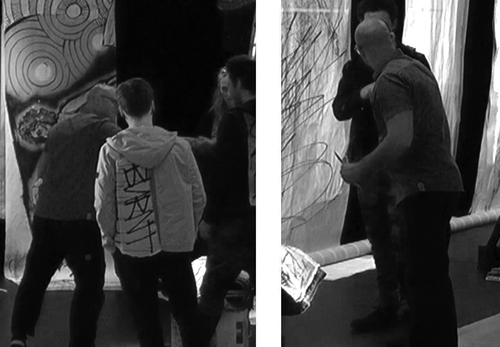
By reframing his instruction as WS, the director implicitly accounts for it, subsuming the arrangement of the piece of cloth under the overarching esthetic principle WS. As in Extracts 1 and 2, WS is invoked to legitimize an esthetic decision, and by retrospectively categorizing a previous instruction as WS, the particulars of the director’s instruction and his material action of arranging the cloth reflexively specify the local meaning of WS. Yet again these meaning components are not explicitly assigned to WS; they are only implicitly associated with the expression by virtue of the sequential relationship between the preceding instructions and the account/assessment in terms of WS. The description of an imaginary spectator’s inference from the visual impression of the arrangement (if it’s semi fold if it looks like) to the action that has produced the arrangement (someone took it off their body and tossed it there) epitomizes the paradoxical status of WS as a principle of esthetic design: Acting according to WS means to arrange things artfully in a way so that their arrangement looks unplanned. The difference between recognizably purposeful versus seemingly casual esthetic action is nicely conveyed by contrasting the verbs put and toss as action descriptors (lines 04 vs. 08).
Although WS undoubtedly has a local denotative and notional meaning in this case, the ritualistic function clearly prevails. The production of WS as a bare expression devoid of clausal embedding and its stylized production with a choked voice index a shared, presupposed interactional history of the expression. Its combination with the greeting gesture makes WS a shibboleth term. It is now used to signal co-membership in a community of practice that subscribes to the same esthetic vision—that is, people who share insider knowledge and a normative common ground.
As in the extracts before, a deep conceptual understanding of WS is neither required to understand the instruction to which it is used as a comment nor to participate in the ritualistic exchange. WS is treated as a core component of the group’s common ground, its shared meaning being taken for granted and unproblematic. Sharing the ritual displays a shared group identity, mutual affiliation, and the declaration of the participants to subscribe to the same beliefs, without necessarily knowing or showing or checking whether their beliefs are really identical. The ritual does not require a shared understanding of WS but on the ability to participate in the ritualistic behavior in a sanctioned way. The ritual thus does not add to the cognitive common ground, but it stabilizes the idea that WS is a central piece of knowledge and a shared esthetic value in the community of practice. As a ritual, it not only indicates but also celebrates the attainment of common ground.
Discussion and conclusion
In this section, we summarize and discuss our findings from our longitudinal study of the use of WS in a transient project community emerging over a series of theater rehearsals. We review how meanings of WS develop and change and how common ground is built over time. The discussion revisits the notion of common ground concerning (a) possibilities and problems of identifying common ground, (b) the relationship between common ground and other pragmatic dimensions of commonality within a community of practice, and (c) the relationship between grounding and other forms of indexing common ground.
The emergence of meaning over an interactional history
We have tracked the process of the appropriation and spread of an expression in a transient community of practice. In the beginning of the rehearsal process, WS is a new expression for all but one of the members of this emerging community. In later uses, participants index in various ways that their use of WS builds on a shared interactional history, e.g., by quotative use, prosodic stylization, whispering delivery, demonstrative article, modal particles, or bare use without a syntactic frame. Over the course of the interactional history, the meaning of WS is both increasingly enriched and stabilized (see Deppermann & Pekarek Doehler, 2021/this issue). WS occurs in two different contexts: on the one hand in situated esthetic assessments and on the other hand in statements and discussions on esthetics. Mostly, WS is used (predominantly by the director) as a positive esthetic assessment. In this use, which is present in all extracts shown, the meaning of WS is not explicated, but WS receives a situated referential specification by virtue of preceding predications and embodied demonstrations that are summarized and accounted for by WS (not in a flat line, uneven, awkward, not centered, semi-fold, not put but tossed). These situated uses thus provide exemplary meanings, i.e., a partial situated semantics that can serve as a model for future uses and understandings. The meaning of WS in our data thus is primarily achieved by being recurrently used for certain actions and by implicit contextual relations to prior talk and to the concrete local material configurations. Although the local and sequential context constrains and clarifies the meaning of WS at each occasion, it does not exhaust it but leaves space for additional interpretations.
Only in one sequence is the meaning of WS explicitly negotiated (Extract 2) by way of candidate understandings, other correction, and meaning explications (middle of the golden section, off from symmetrical, made by humans not by machines, hand-made look, like the Japanese gardens are raked). This meta-semantic discourse does not provide a straightforward, all-encompassing definitionFootnote7 but draws on examples and partial, aspectual, situated meanings. Over the occurrences of WS, there is an accumulation of referential contexts that enrich the semantics of WS. At the same time, they amount to a confirmation and stabilization of the meaning of WS because they concern spatial configurations and visual qualities that are all characterized by a lack of symmetry, imperfection, and seemingly unintended visual properties. Still, the connection of WS to the idea that beauty is the concentrated attempt of perfection (Extract 4) seems to introduce a different meaning of WS. This is also corroborated by the fact that in Extract 5, symmetry is positively assessed by reference to concentration. Thus, there is not only convergent enrichment and stabilization of meanings over time but also diversification—i.e., meanings that concern different facets of esthetic production (the shape of the product vs. the attitude of the artist) and can lead to contradictory assessments (here: concerning symmetry).
Varieties of commonality in a community of practice
The emergence of common ground in real life becomes manifest by a greater range of observable phenomena and concerns more orders of interactional practice than in laboratory settings. At the same time, to which degree common ground is actually shared is often more opaque.
Manifestation and opacity of common ground
According to Clark, common ground is established by grounding sequences in which shared meanings are accomplished by participants’ consecutive actions by which they present their own understandings and accept others’. In Clark’s model, grounding thus is a sequentially organized, responsive process. Grounding activities can provide different degrees of strength of evidence for understandings and thus for common ground as well: Formulations, explications of inferences, and candidate understandings make meanings explicit and demonstrate how the speaker has understood an action or an expression. In contrast, next actions that presuppose a certain understanding make understandings only inferable to a greater or lesser extent: Repetitions and acknowledgment tokens of various sorts (e.g., continuers, change-of-state tokens, positive assessments) only claim understanding, (Sacks, Citation1992, 141 et seq). Moreover, the precise understanding of an individual expression cannot be clearly inferred from participants’ understanding displays that concern the action in which the expression is used. This is also due to the fact that the retrospective scope of responses often is fuzzy. However, the actual extent of shared knowledge in single interactional episodes often remains opaque for both participants and analysts (see Extract 1). Which understandings are entertained and how much common ground actually holds often only becomes apparent over an interactional history that includes critical contexts in which participants (are forced to) demonstrate their understandings. Yet even in sequences like Extract 2, in which participants explicate understandings, the explication remains partial and open-ended, i.e., always presupposing other, unstated understandings and being expandable (Garfinkel, Citation1967). This in turn means that nonreferential, notional common ground cannot be definitely verified but only checked and confirmed in relation to the practical purposes it has to serve.
In our data, common ground becomes manifest in other ways as well. Apart from responsive grounding practices, we found remote adoptions of WS. In contrast to responsive grounding, in remote appropriations the expression is applied by another participant on their own initiative and not in response to a sequentially immediately prior use by another participant. Remote appropriations are not sequentially adjacent; they are phenomena belonging both to an interactional and personal history of using an expression on different occasions at different points in time, which may be rather far away from each other. Since appropriations are not sequentially adjacent, they are not designed to show how a speaker has understood the coparticipants’ prior use of an expression, yet they index (or even explicate) the speaker’s own understanding of an expression and what they presuppose as common ground, which can be inspected and confirmed or disconfirmed by others. Still, their (dis-)confirmation does not necessarily index that they take the other speaker’s use of the expression to be the same as theirs (at a previous occasion).
The ways in which common ground can become manifest depends on the participant’s activities. The possibility for remote appropriations is much more restricted, e.g., in an experimental setting, in which the range of possible actions is narrowly constrained by the experimental task. Strong evidence for understanding can be provided if it has to be demonstrated by compliant actions like following an instruction or executing a command (Deppermann, Citation2015b).
In our study, we have tracked understandings and uses of an expression in a transient project community. Although Clark studies the establishment of common ground in dyads, the process is much more heterogeneous and opaque in multiparty interactions (see also Koschmann & LeBaron, Citation2003). Understandings are neither uniform nor stable across the community but role dependent. In this community, the director has introduced WS, and he is the expert for WS, whereas the others are novices who learn the term—more or less. Although the actor and the assistant director use WS and check and enhance their understanding of it, others (as the stage technician) neither use it nor do they even respond to it. The role-dependent stocks of knowledge and the different ways of using WS are to a high degree related to the relevance WS does (potentially) have for the ways in which they perform their roles within the division of labor in the community. Thus, there is no uniform common ground within a community of practice and not even among all those who are copresent during an interactional event.
Differences in epistemic status, concerning depth and certainty of understanding of WS, do not only show up in the interaction between more and less knowledgeable participants. In their turn design, participants themselves index to which degree they take their understanding to be correct and common ground. Marking uses as being tentative and quotative, word searches and pronunciation problems, speaking whisperingly and softly, and delegating expertise and responsibility to others all downgrade the claim to knowledge and certainty; marking self-evidence and using WS for concluding statements, in contrast, display claims to expertise and authority.
Orders of commonality
Our study shows that with respect to the use of a linguistic expression as WS, it is important to distinguish between cognitive common ground—i.e., intersubjective understandings of the expression—and shared uses of it. Intersubjectivity of understandings concerns the order of notional meaning and encyclopedic knowledge associated with WS. This cognitive common ground becomes particularly evident and relevant if the meaning of an expression is explicated, negotiated, or expanded as in Extracts 2, 4, and 5. A quite distinct order of commonality is practical, the emergence of shared practices—i.e., routine ways in which an expression is used as a constitutive part of social actions. We saw that WS is used as a means for (concluding) esthetic assessments and accounting for esthetic decisions. In the interactional history at hand, we could see how derivative uses of WS developed from the practice of esthetic assessment: as notionalization or ironic, playful and ritual uses of WS as a shibboleth, flagging normative common ground and thus group identity as an artistic community of practice devoted to shared esthetic values. The order of commonality that is accomplished by shared practices arises from the (professional) activities and actions, the participation framework, and other epistemic, socioemotional, and material conditions that matter for the community of practice at hand.
Intersubjective meanings and shared practices are not only conceptually distinct. Knowing how to use an expression for certain actions and how to respond to it are partly independent from understanding its meaning. It is possible to understand the meaning of an expression but never use it nor be able to use it in ways as other people use it. It is often equally possible to align and affiliate with actions in which the expression is used without having the same (or any) understanding of the expression as the speaker. Which criteria for understanding and ability to use the expression hold again depends on the type of activity. Yet in principle, the appropriation of an expression often will entail reciprocal effects: Practical uses enrich meanings, while meaning explications and negotiations inform practical use.
Disclosure statement
No potential conflict of interest was reported by the authors.
Notes
1 Because we are dealing with a transient community (Mortensen, Citation2017) and not with long-lasting communities (to which Wenger refers), we focus on the beginning of emerging routines.
2 All recordings were made with informed consent of the participants. Names and other identifiers have been anonymized. Images may be used without anonymization.
3 Images are licensed through Creative Commons.
4 This introduction of wabi sabi as a conceptual guideline for the play took place during the conceptual rehearsals two months before the beginning of the scenic rehearsals.
5 “In mathematics, two quantities are in the golden ratio if their ratio is the same as the ratio of their sum to the larger of the two quantities” (Wikipedia, Citationn.d.). The golden ratio or golden section is widely used in art and architecture and is perceived as esthetically pleasing.
6 According to Goffman (Citation1979, pp. 16–17), the animator is the speaker acting as “sounding box,” while the principal is “someone whose position is established by the words that are spoken.” Change between these two footings here is indicated by back-referring indexical terms (eben; dieses) and not by prosodic or paralinguistic framings (see Couper-Kuhlen, Citation1999 on voicing).
7 Note that part of the discourse on wabi sabi is the insistence that it is ultimately undefinable and cannot be fully grasped rationally (Koren, Citation2008, p. 15–18).
References
- Arundale, R. (2020). Communicating & relating: Constituting face in everyday interacting. Oxford University Press.
- Auer, P. (1981). Zur indexikalitätsmarkierenden Funktion der demonstrativen Artikelform in deutschen Konversationen. In G. Hindelang & W. Zillig (Eds.), Sprache: Verstehen und Handeln (pp. 301–311). Niemeyer.
- Betz, E., & Deppermann, A. (2018). Indexing priority of position: Eben as response particle in German. Research on Language and Social Interaction, 51(2), 171–193. https://doi.org/10.1080/08351813.2018.1449449
- Bilmes, J. (2011). Occasioned semantics: A systematic approach to meaning in talk. Human Studies, 34(2), 129–153. https://doi.org/10.1007/s10746-011-9183-z
- Bilmes, J. (2015). The structure of meaning in talk: Explorations in category analysis. Volume I: Co-categorization, contrast, and hierarchy. University of Hawaii. http://www2.hawaii.edu/~bilmes
- Clark, H. H. (1996a). Using language. Cambridge University Press.
- Clark, H. H. (1996b). Communities, commonalities, and communication. In J. Gumperz & S. Levinson (Eds.), Rethinking linguistic relativity (pp. 324–355). Cambridge University Press.
- Clark, H. H., & Brennan, S. (1991). Grounding in communication. In L. B. Resnick, J. M. Levine, & S. D. Teasley (Eds.), Perspectives on socially shared cognition (pp. 127–149). APA.
- Clark, H. H., & Schaefer, E. F. (1992). Contributing to discourse. In H. H. Clark (Ed.), Arenas of language use (pp. 144–197). University of Chicago Press.
- Clark, H. H., Schreuder, R., & Buttrick, S. (1983). Common ground and the understanding of demonstrative reference. Journal of Verbal Learning and Verbal Behavior, 22(2), 245–258. https://doi.org/10.1016/S0022-5371(83)90189-5
- Couper-Kuhlen, E. (1999). Coherent voicing. On prosody in conversational reported speech. In W. Bublitz, U. Lenk, & E. Ventola (Eds.), Coherence in spoken and written discourse. How to create it and how to describe it (pp. 19–34). John Benjamins.
- Deppermann, A. (2005). Conversational interpretation of lexical items and conversational contrasting. In A. Hakulinen & M. Selting (Eds.), Syntax and lexis in conversation (pp. 289–317). John Benjamins.
- Deppermann, A. (2011a). Notionalization: The transformation of descriptions into categorizations. Human Studies, 34(2), 155–181. https://doi.org/10.1007/s10746-011-9186-9
- Deppermann, A. (Ed.). (2011b). Formulation, generalization, and abstraction in interaction. Human Studies, 34(2), 115–227. https://link.springer.com/journal/10746/volumes-and-issues/34-2
- Deppermann, A. (2014). Don’t get me wrong: Recipient design by reactive and anticipatory uses of negation to constrain an action’s interpretation. In S. Günthner, W. Imo, & J. Bücker (Eds.), Grammar and dialogism. Sequential, syntactic, and prosodic patterns between emergence and sedimentation (pp. 15–51). De Gruyter.
- Deppermann, A. (2015a). Retrospection and understanding in interaction. In A. Deppermann & S. Günthner (Eds.), Temporality in interaction (pp. 57–94). John Benjamins.
- Deppermann, A. (2015b). When recipient design fails: Egocentric turn-design of instructions in driving school lessons leading to breakdowns of intersubjectivity. Gesprächsforschung 16, 63–101. http://www.gespraechsforschung-ozs.de/2015.html
- Deppermann, A. (2018). Changes in turn-design over interactional histories – The case of instructions in driving school lessons. In A. Deppermann & J. Streeck (Eds.), Time in embodied interaction. Synchronicity and sequentiality of multimodal resources (pp. 293–324). John Benjamins.
- Deppermann, A. (2020). Interaktionale Semantik. In J. Hagemann & S. Staffeldt (Eds.), Semantiktheorien II (pp. 235–278). Stauffenburg.
- Edwards, D. (1997). Discourse and cognition. Sage.
- Enfield, N. J. (2013). Relationship thinking. Oxford University Press.
- Fetzer, A., & Fischer, K., Eds. (2007). Lexical markers of common ground. Elsevier.
- Firth, A. (1996). The discursive accomplishment of normality: On ‘lingua franca’ English and conversation analysis. Journal of Pragmatics, 26(2), 237–259. https://doi.org/10.1016/0378-2166(96)00014-8
- Garfinkel, H. (1967). Studies in ethnomethodology Prentice-Hall.
- Garfinkel, H., & Wieder, L. (1992). Two incommensurable, asymmetrically alternate technologies for social analysis. In G. Watson & R. M. Seiler (Eds.), Text in context: Contributions to ethnomethodology (pp. 175–206). SAGE.
- Goffman, E. (1979). Footing. Semiotica, 25(1–2), 1–29. https://doi.org/10.1515/semi.1979.25.1–2.1
- Goodwin, C. (1994). Professional vision. American Anthropologist, 96(3), 606–633. https://doi.org/10.1525/aa.1994.96.3.02a00100
- Goodwin, C. (2000). Action and embodiment within situated human interaction. Journal of Pragmatics, 32(10), 1489–1522. https://doi.org/10.1016/S0378-2166(99)00096-X
- Hazel, S. (2017). Mapping the landscape – Developing multilingual norms in a transient project community. Journal of Linguistic Anthropology, 27(3), 308–325. https://doi.org/10.1111/jola.12167
- Hazel, S. (2018). Discovering interactional authenticity: Tracking theatre practitioners across rehearsals. In S. Pekarek Doehler, J. Wagner, & E. Gonzalez-Martinez (Eds.), Longitudinal studies on the organization of social interaction (pp. 255–283). Palgrave Macmillan.
- Heritage, J., & Stivers, T. (1999). Online commentary in acute medical visits: A method of shaping patient expectations. Social Science & Medicine, 49(11), 1501–1517. https://doi.org/10.1016/S0277-9536(99)00219-1
- Jefferson, G. (1979). A technique for inviting laughter and its subsequent acceptance/declination. In G. Psathas (Ed.), Everyday language: Studies in ethnomethodology (pp. 79–96). Irvington.
- Koren, L. (2008). Wabi-sabi for artists, designers, poets & philosophers. Imperfect Point Reyes.
- Koschmann, T., LeBaron, C., Goodwin, C., & Feltovich, P. (2001). Dissecting common ground: Examining an instance of reference repair. In J. D. Moore & K. Stenning (Eds.), Proceedings of the Twenty-Third Annual Conference of the Cognitive Science Society (pp. 516–521). Lawrence Erlbaum.
- Koschmann, T., & LeBaron, C. D. (2003). Reconsidering common ground: Examining Clark’s contribution theory in the OR. In K. Kuutti et al. (Eds.), ECSCW 2003: Proceedings of the Eighth European Conference on Computer Supported Cooperative Work, 14–18 September 2003, Helsinki, Finland (pp. 1–20). Springer.
- Lave, J., & Wenger, E. (1991). Situated learning: Legitimate peripheral participation. Cambridge University Press.
- Mortensen, J. (2017). Transient multilingual communities as a field of investigation: Challenges and opportunities. Journal of Linguistic Anthropology, 27(3), 271–288. https://doi.org/10.1111/jola.12170
- Pekarek Doehler, S., & Balaman, U. (2021/this issue). The routiniziation of grammar as a social action format: A longitudinal study of video-mediated interactions. Research on Language and Social Interaction, 54(2), 183–202. https://doi.org/10.1080/08351813.2021.1899710
- Pekarek Doehler, S., Wagner, J., & Martinez-Gonzales, E., Eds. (2018). Longitudinal studies on the organization of social interaction. Palgrave Macmillan.
- Sacks, H. (1992). Lectures on conversation (Vol. 2). Blackwell.
- Schegloff, E. A. (1991). Reflections of talk and social structure. In D. Boden & D. H. Zimmerman (Eds.), Talk and social structure (pp. 44–70). Cambridge University Press.
- Schütz, A. (1967[1932]). The phenomenology of the social world. Northwestern.
- Sidnell, J. (2014). The architecture of intersubjectivity revisited. In N. J. Enfield, P. Kockelman, & J. Sidnell (Eds.), Cambridge handbook of linguistic anthropology (pp. 364–399). Cambridge University Press.
- Skogmyr Marian, K. ( 2021/this issue). Initiating a complaint: Change over time in French L2 speakers’ practices. Research on Language and Social Interaction, 54(2), 163–182. https://doi.org/10.1080/08351813.2021.1899709.
- Stalnaker, R. (2002). Common ground. Linguistics and Philosophy, 25(5/6), 701–721. https://doi.org/10.1023/A:1020867916902
- Suzuki, D. T. (1959). Zen and Japanese culture. Bollingen.
- Szczepek-Reed, B. (2007). Prosodic orientation in English conversation. Palgrave Macmillan.
- Wenger, E. (2008). Communities of practice: Learning, meaning, and identity. Cambridge University Press.
- Wikipedia. (n.d.). Golden ratio. Wikimedia Foundation. https://en.wikipedia.org/wiki/Golden_ratio
- Wittgenstein, L. (1953[1950]). Philosophical investigations ( G. E. M. Anscombe, Trans.). Blackwell.


